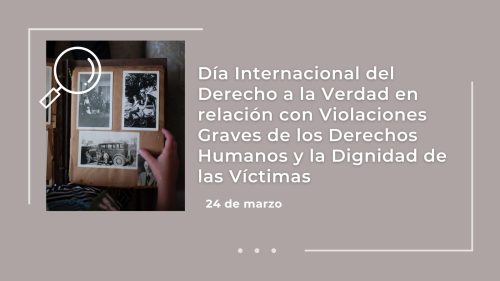
Never again, always true
Today, as we do every March 24, we commemorate the International Day for the Right to the Truth in relation to Serious Violations of Human Rights and Dignity of Victimsproclaimed by the General Assembly of the United Nations in the Resolution 65/196 2010, in order to remember the victims, promote memory and guarantee the right to truth and justice and the non-repetition of what happened in the past.
The right to know the truth The report on gross violations of human rights and serious crimes is part of international human rights law and international humanitarian law, it entails having full and complete knowledge of the acts that occurred, the persons involved and the specific circumstances to help end impunity, and to promote and protect human rights.
Knowing the truth offers victims and their families a way to put an end to their suffering, regain dignity and alleviate some of the pain of the losses they have suffered. However, the right to the truth is not only an individual right, it is also a collective right: revealing the truth also helps entire societies to promote accountability for violations.
This makes it possible to restore the order disturbed by the violation, particularly in periods of transition following dictatorships or armed conflicts characterized by serious human rights violations.
Therefore, the right to the truth is linked to the State’s obligation and duty to protect and guarantee human rights, conduct effective investigations and provide reparations to the victims.
Therefore, the objective of commemorating this day is to promote the memory of the victims of summary executions, forced disappearances, child abductions or torture, who throughout the world demand to know what happened and who is responsible, and pay tribute to those who have dedicated their lives to the struggle for human rights and against impunity for the most serious international crimes and who have lost them in that endeavor.
As we do every year, we participated in the event “The Right to the Truth in the Law of Democratic Memory.”organized by the Platform for the Truth Commission, which took place in the Spanish Senate, with the objective of celebrating the Law 20/2022, of October 19, 2002, on Democratic Memory.
The day was marked by the demand for a greater commitment from political institutions to the right to truth. Several speakers reflected on the right to truth from their respective disciplines. We were able to listen to historian and teacher Fernando Hernández Sánchez, who highlighted the lack of knowledge of the Franco era among young people; lawyer Manuel Ollé, who spoke about the guarantees of non-repetition derived from international law; the lawyer and politician Cristina Almeida, who vindicated the loss of women’s rights during Franco’s regime; the researcher Marián López Fernández-Cao, who explained the psychology of trauma and the importance of forgiveness; and the teacher Eduardo Cabornero, who called for the work of educational centers and institutions in making the truth known.
During their intervention, the senators of the political groups Esquerra Republicana, Partido Nacionalista Vasco and Unidad Podemos referred to the law 20/2022 on democratic memory and the great challenge of implementing it, which is being slower than their parties would like. Finally, representatives of different associations such as Movimiento por la Paz and Cultura de Paz participated. These entities denounced the administrative obstacles encountered to carry out the exhumation of graves and the non-existence of a Truth Commission.
In addition, today we are in the historic march for the National Day of Memory, Truth and Justice in Argentina, which on this date commemorates the victims of the last military dictatorship, self-styled “National Reorganization Process”.
This date invites us not to forget what happened on March 24, 1976, when one of the darkest periods of history began in Argentina. On that day, the Armed Forces seized power through a coup d’état and overthrew the then constitutional government of Isabel Perón, initiating a civil-military dictatorship that would last until 1983. During that period thousands of people were tortured in clandestine detention centers, disappeared and murdered.
Remembering is a vital collective exercise, which implies reaffirming the value of life and of democracy as an institutional framework to guarantee human rights.
The FIBGAR team
Madrid, March 24, 2023



